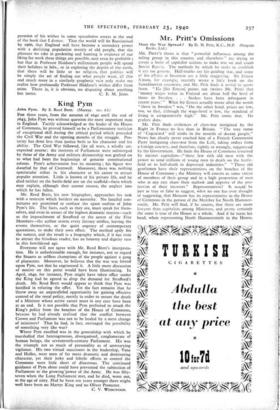King Pym
-John Pym. By S. Reed Brett. (Murray. 103. 61) FOR three years, from the autumn of 1640 until the end of 1643, John Pym was without question the most important man in England. Tacitly acknowledged as the leader of the House of Commons, he proved himself to be a Parliamentary tactician of exceptional skill during the critical period which preceded the Civil War and the opening months of the struggle. Pos- terity has done less than justice both to his character and his ability. The Civil War followed, like all wars, a wholly un- expected course: the interests of Parliament were submerged by those of the Army and military dictatorship was grafted on to what had been the beginnings of genuine constitutional reform. Pym's achievement lost its meaning ; his figure was dwarfed by that of Cromwell. Moreover, there was nothing spectacular either in his character or his career to attract popular attention. Little is known of his private life, and he died neither on the battle-field nor on the scaffold—facts which may explain, although they cannot excuse, the neglect into which he has fallen.
Mr. Reed Brett, his new biographer, approaches his task with a restraint which borders on austerity. No fanciful con- jectures are permitted to confuse the spare outline of John Pym's life. The facts, such as they are, must speak for them- selves, and even in scenes of the highest dramatic tension—such as the impeachment of Strafford or the arrest of the Five Members—the author scorns every literary artifice, leaving the events themselves, or the quiet urgency of contemporary quotations, to make their own effect. The method aptly fits the subject, and the result is a biography which, if it has little to attract the frivolous reader, has an honesty and dignity rare in this bewildered age.
Everyone will not agree with Mr. Reed Brett's interpreta- tion. He is unfashionable enough, for instance, not to regard the Smarts as selfless champions of the people against a gang of plutocrats. Moreover, he believes that the war was forced upon Pym, not that he engineered it. A little more discussion of motive on this point would have been illuminating. In April, 1640, for instance, Pym might have taken office under the King had he agreed to drop the demand for Strafford's death. Mr. Reed Brett would appear to think that Pym was justified in refusing the offer. Yet the fact remains that he threw away an unparalleled opportunity for gaining effective control of the royal policy, merely in order to secure the death of a Minister whose active career must in any case have been at an end. Is it not possible that Pym preferred to attack the King's policy from the benches of the House of Commons, because he had already realised that the conflict between Crown and Parliament was not to be healed by a mere change of ministers? That he had, in fact, envisaged the possibility of something very like war?
Where Pym excelled was in the generalship with which he Marshalled that heterogeneous, disorganised, conglomerate of human beings, the seventeenth-century Parliament. His was the triumph not so much of personality as of unwearying vigilance. His two virtual successors in the leadership, Vane and Holies, were men of far more dramatic and dominating charactex, yet their jerky and febrile efforts to control the Commons were little short of disastrous. The continued guidance of Pym alone could have prevented the subjection of Parliament to the growing power of the Army. He was fifty- seven when the Long Parliament met, and he died, worn out, at the age of sixty. Had he been ten years younger there might well have been no Martyr King and no Oliver Protector.
C. V. WEDGWOOD.






































 Previous page
Previous page